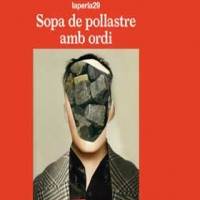CRÍTIQUES

VALORACIÓ
8
My socialism is better than yours…
Publicat el: 5 de març de 2018
CRÍTiCA: Sopa de pollastre amb ordi
This Catalan version of Arnold Wesker’s 1956 play, centred on a working class family living in London, is a finely staged and well-choreographed production, featuring a strong central performance by Màrcia Cisteró as the die-hard socialist Sarah Kahn. Wesker’s play centres on the ideals and growing disillusionment of the Kahn family, East End (London) Jews living through a tumultuous 20 years of the 20th century. Sarah fans the flames of socialist idealism while serving tea and soup, but her husband Harry (Lluís Villanueva) is lazy and a liar. Their children Ada (Maria Rodriguez) and Ronnie (Pol Lopez) are young passionate idealists, who (like most of us!) get a shock when real life hits them.
We begin in 1936 and excitement is in the air. The family prepare to blockade the streets, for the fascists are on the march! The reference is to the march of the ‘blackshirts’ of Sir Oswald Mosley, the sinister leader of the British Union of Fascists. The Khans talk of travelling to Spain to fight for the Second Republic. Notably, while the play has been implied in its publicity to relate to the movement for Catalan independence – it is not about nationhood or identity, but working class solidarity with Europe through universal socialist ideals.
After World War II things have changed. The family home is better furnished, but news of Soviet atrocities sees socialism as a unifying party principle begin to fall apart. Ada moves to the country. Ronnie departs for Paris to pursue a bohemian life. Harry, after two strokes, settles into his armchair for life. Yet Sarah remains adamantly socialist.
At the end of the play it is 1956 when the Soviet invasion of Hungary saw the betrayal of the socialist ideal. A broken Ronnie returns disillusioned by working life, and political institutions pumped up by empty propaganda: “Why do I feel ashamed to use words like democracy and freedom?” asks Ronnie. It’s a good question. Sarah’s response: that you “must care or you’ll die” leaves a chasm between them; one – importantly – left unresolved in Wesker’s text. Although this production has other ideas.
CRÍTIQUES RELACIONADES / Sopa de pollastre amb ordi
TÍTOL CRÍTiCA: Memòria d’olors i sabors que alimenten l’esperit
PER: Iolanda G. Madariaga

VALORACiÓ
8
TÍTOL CRÍTiCA: Actors, desengany i aparició i desaparició d’objectes
PER: Jordi Bordes

VALORACiÓ
9
TÍTOL CRÍTiCA: Un brou de galets amb gallina de pota negra
PER: Andreu Sotorra

VALORACiÓ
9
TÍTOL CRÍTiCA: les orelles del llop
PER: Francesc Massip

VALORACiÓ
8


